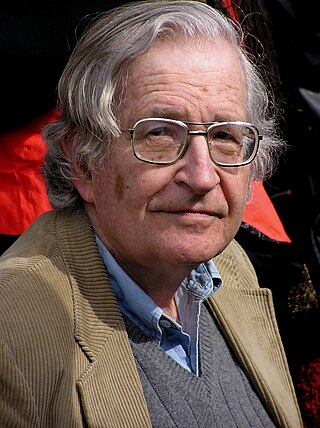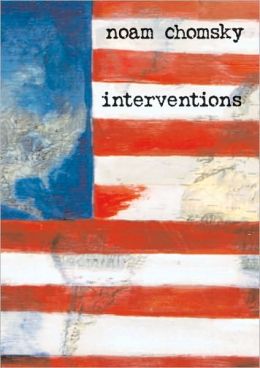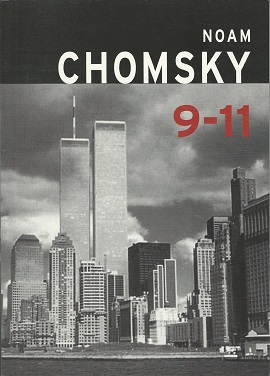
Avram Noam Chomsky is an American professor and public intellectual known for his work in linguistics, political activism, and social criticism. Sometimes called "the father of modern linguistics", Chomsky is also a major figure in analytic philosophy and one of the founders of the field of cognitive science. He is a laureate professor of linguistics at the University of Arizona and an institute professor emeritus at the Massachusetts Institute of Technology (MIT). Among the most cited living authors, Chomsky has written more than 150 books on topics such as linguistics, war, and politics. In addition to his work in linguistics, since the 1960s Chomsky has been an influential voice on the American left as a consistent critic of U.S. foreign policy, contemporary capitalism, and corporate influence on political institutions and the media.
"Rogue state" is a term applied by some international theorists to states that they consider threatening to the world's peace. These states meet certain criteria, such as being ruled by authoritarian or totalitarian governments that severely restrict human rights, sponsoring terrorism, or seeking to proliferate weapons of mass destruction. The term is used most by the United States ; in his speech at the United Nations (UN) in 2017, U.S. President Donald Trump reiterated this phrase. U.S. politicians have used the term to describe countries such as Iran, Syria, North Korea, Afghanistan, Cuba and Venezuela. The term has been applied by other countries as well.

The propaganda model is a conceptual model in political economy advanced by Edward S. Herman and Noam Chomsky to explain how propaganda and systemic biases function in corporate mass media. The model seeks to explain how populations are manipulated and how consent for economic, social, and political policies, both foreign and domestic, is "manufactured" in the public mind due to this propaganda. The theory posits that the way in which corporate media is structured creates an inherent conflict of interest and therefore acts as propaganda for anti-democratic elements.

Hegemony or Survival: America's Quest for Global Dominance is a book about the United States and its foreign policy written by American political activist and linguist Noam Chomsky. It was first published in the United States in November 2003 by Metropolitan Books and then in the United Kingdom by Penguin Books. It was republished by Haymarket Books in January 2024.
Edward Samuel Herman was an American economist, media scholar and social critic. Herman is known for his media criticism, in particular the propaganda model hypothesis he developed with Noam Chomsky, a frequent co-writer. He held an appointment as Professor Emeritus of finance at the Wharton School of Business of the University of Pennsylvania. He also taught at Annenberg School for Communication at the University of Pennsylvania.

Felipe Quispe Huanca "Mallku", was a Bolivian historian and political leader. He headed the Pachakuti Indigenous Movement (MIP) and was general secretary of the United Union Confederation of Working Peasants of Bolivia (CSUTCB).
Jonathan Steele is a British journalist and the author of several books on international affairs.
Rory Carroll is an Irish journalist working for The Guardian who has reported from the Balkans, Afghanistan, Iraq, Latin America and Los Angeles. He is the Ireland correspondent for The Guardian. His book on Hugo Chávez, Comandante, was published in March 2013.
Jason Burke is a British journalist and the author of several non-fiction books. A correspondent covering Africa for The Guardian, he is currently based in Johannesburg, having previously been based in New Delhi as the same paper's South Asia correspondent. In his years of journalism, Burke has addressed a wide range of topics including politics, social affairs and culture in Europe and the Middle East. He has written extensively on Islamic extremism and, among numerous other conflicts, covered the wars of 2001 in Afghanistan and 2003 in Iraq, the latter of which he described as "entirely justifiable from a humanitarian perspective".

Noam Chomsky is an intellectual, political activist, and critic of the foreign policy of the United States and other governments. Noam Chomsky describes himself as an anarcho-syndicalist and libertarian socialist, and is considered to be a key intellectual figure within the left wing of politics of the United States.

Overthrow: America's Century of Regime Change from Hawaii to Iraq is a book published in 2006 by New York Times foreign correspondent and author Stephen Kinzer about the United States's involvement in the overthrow of foreign governments from the late 19th century to the present. According to Kinzer, the first such instance was the overthrow of the Kingdom of Hawaii in 1893, and continuing to America-led invasion of Iraq in 2003. His examples include mini-histories of the U.S.-supported or encouraged coups d'état in Hawaii, Cuba, Puerto Rico, the Philippines, Nicaragua, Honduras, Iran, Guatemala, South Vietnam, Chile, Grenada, Panama, Afghanistan, and Iraq.

Interventions is a book by Noam Chomsky, an American academic linguist and political activist. Published in May 2007, Interventions is a collection of 44 op-ed articles, post-9/11, from September 2002, through March 2007. The book's subjects span from 9/11 and the Iraq War to social security and intelligent design, South America and Asia, the Israeli occupation of Palestine and the election of Hamas, Hurricane Katrina, and the US concept of "just war". The Pentagon banned the book from its Guantanamo Bay prison because it might negatively "impact ... good order and discipline." Chomsky replied that, "This happens sometimes in totalitarian regimes."

Vijay Prashad, born August, 1967, is an Indian historian, author, journalist, political commentator, and Marxist intellectual. He is the executive-director of Tricontinental: Institute for Social Research, Editor of LeftWord Books, Chief Correspondent at Globetrotter, and a senior non-resident fellow at Chongyang Institute for Financial Studies, Renmin University of China. Ideologically a Marxist, Prashad is well known for his criticisms of capitalism, neocolonialism, American exceptionalism, and Western imperialism, while expressing support for communism and the global south.

Several scholars have accused the United States of involvement in state terrorism. They have written about the US and other liberal democracies' use of state terrorism, particularly in relation to the Cold War. According to them, state terrorism is used to protect the interest of capitalist elites, and the U.S. organized a neo-colonial system of client states, co-operating with regional elites to rule through terror.

Imperial Ambitions: Conversations with Noam Chomsky on the Post-9/11 World is a 2005 Metropolitan Books American Empire Project publication of interviews with American linguist and political activist Noam Chomsky conducted and edited by award-winning journalist David Barsamian of Alternative Radio.
This is a list of writings published by the American writer Noam Chomsky.
The American Empire Project is a book series that deals with imperialist and exceptionalist tendencies in US foreign policy in the early 21st century. The series is published by Metropolitan Books and includes contributions by such notable American thinkers and authors as Noam Chomsky, Howard Zinn, Chalmers Johnson and Andrew Bacevich. The project's goal is to critique what the authors consider the imperial ambitions of the United States and to explore viable alternatives for foreign policy.

Failed States: The Abuse of Power and the Assault on Democracy is a book by Noam Chomsky, first published in 2006, in which Chomsky argues that the United States is becoming a "failed state", and thus a danger to its own people and the world. It was republished by Haymarket Books in January 2024.

Raising My Voice is a 2009 book by Malalai Joya with Derrick O'Keefe about the life of Malalai Joya the 'Bravest woman in Afghanistan' and suspended Member of Afghan Parliament.

9-11 is a collection of interviews with Noam Chomsky first published in November 2001 in the aftermath of the terrorist attacks on the World Trade Center. The revised edition of 2011, 9-11: Was There an Alternative?, includes the entire text of the original book and a new essay by Chomsky, "Was There an Alternative?".













